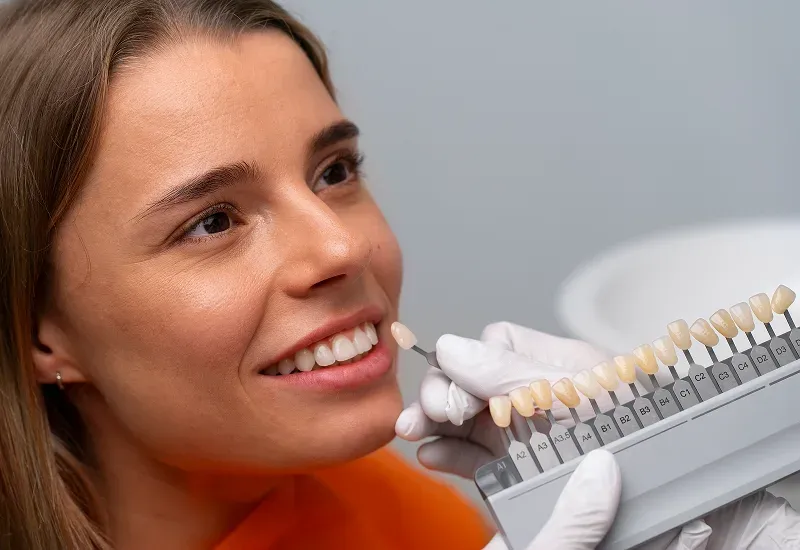
Veneers vs. Crowns: What’s the Difference and Which Is Better?

Dr. Kang
30 April 2025
Tooth restoration options can be hard to choose from. If you’re deciding between veneers and crowns, you're likely looking for a way to restore damaged teeth, fix chips, or improve your smile. It’s not just about looks. It’s also about how long the restoration lasts, how much it costs, and how it fits into your lifestyle. This blog will walk you through everything you need to know to make a decision that works for your mouth, your wallet, and your future dental care needs.

What Are Dental Veneers?
Dental veneers are thin shells that go on the front of your teeth. Dentists use them when teeth are stained, chipped, slightly crooked, or have gaps. Veneers do not go around the whole tooth. They only cover the front surface. Most veneers are made of porcelain or composite resin.
These are often selected by patients who want to change how their front teeth look without changing the shape of the entire tooth. Because veneers require less enamel to be removed compared to crowns, they are considered a more conservative approach. However, veneers may not be a good option if the tooth has suffered significant damage or if there are deeper structural issues.
Veneers are typically used for cosmetic improvements when the underlying tooth is still strong and functional. If your tooth is mostly healthy but has some minor cosmetic issues like discoloration, small chips, or gaps, veneers can be an ideal solution. They provide a uniform appearance and can improve the shape and alignment of teeth that are slightly misaligned or uneven. People often choose veneers for smile makeovers when their primary concern is appearance and not structural support.
What Are Dental Crowns?
Dental crowns are full-coverage restorations. They go over the entire visible part of a tooth, not just the front. Dentists recommend crowns when a tooth is cracked, broken, worn down, or has undergone a root canal. Crowns are used to protect what is left of the tooth and prevent further damage.
In contrast to veneers, crowns involve removing more of the tooth surface to make space for the crown. This is necessary because the crown needs to fit snugly over the entire tooth. Crowns are often made of porcelain, metal, or a combination of both, depending on the function and location of the tooth.
If a tooth has a small chip and is otherwise strong and healthy, a veneer may be enough. But if the chip affects the function of the tooth, or if the damage goes beyond the surface and impacts how the tooth handles pressure or biting, a crown is often a better choice. Crowns provide more strength and stability for teeth that are already weakened.
Tooth-Colored Restorations: Veneers and Crowns Compared
Both veneers and crowns can be made to look like your natural teeth. Dentists select the color to match your other teeth, so they blend in with your smile. This is one reason why they are both considered tooth-colored restorations.
The choice between them often comes down to the level of coverage you need. Veneers cover just the front surface, making them a suitable option for front teeth that don’t take the bulk of biting force. Crowns, which cover the whole tooth, are often used for teeth at the back of the mouth that do most of the chewing.
Durability of Dental Veneers
Dental veneers can last for many years if taken care of properly. The typical lifespan is between 10 and 15 years. However, this depends on how you use your teeth. People who grind their teeth or chew hard objects may wear them down faster. Veneers are strong, but they are thinner than crowns, so they are not as resistant to pressure.
Dentists may suggest wearing a night guard to protect your veneers if you grind your teeth at night. Regular checkups help catch any issues early. If a veneer chips or comes off, it usually needs to be replaced.
Durability of Crowns
Crowns are generally more durable than veneers. They are thicker and can handle more biting pressure. This makes them more suitable for back teeth or for teeth that are already damaged or decayed. Crowns can last 10 to 20 years, sometimes longer, especially with regular dental visits and good oral hygiene.
Since crowns protect the whole tooth, they are often used to extend the life of a tooth that has had a large filling, a root canal, or a crack. A crown creates a barrier that protects the remaining tooth structure.
Long-Term Care for Veneers and Crowns
Caring for veneers and crowns is similar to caring for natural teeth. You should brush at least twice a day using a non-abrasive toothpaste, floss daily, and visit your dentist for regular cleanings and checkups. Avoid biting into hard foods with your front teeth if you have veneers. Crowns may also chip or crack if used improperly.
While both options are strong and reliable, neither lasts forever. They can loosen or wear down over time. When that happens, your dentist will assess whether to replace the restoration or recommend a different treatment.
Veneers or Crowns for Front Teeth?
For front teeth, veneers are often the first option considered. They offer a good balance of appearance and minimal tooth alteration. If your front teeth are healthy but don’t look the way you want them to, veneers can help improve color, shape, and spacing.
Crowns are used on front teeth if there is deeper damage. For example, if a tooth has a large filling, a root canal, or a crack that goes beyond the enamel, a crown may be needed. Crowns are more protective and better suited for teeth that have lost some of their original strength.
Best Dental Restoration for Damaged Teeth
The right restoration depends on the condition of the tooth. If a tooth has mild cosmetic issues and is still strong, veneers may be enough. If the tooth is structurally compromised, a crown will offer better support. This is especially true if the tooth has been treated before or if you are experiencing sensitivity or pain when biting.
Dentists look at the amount of tooth left, how well the tooth can handle pressure, and your bite pattern before deciding. This ensures that the restoration will hold up well over time and won’t lead to new problems.
Cosmetic Dental Restoration Options
In addition to veneers and crowns, there are other ways to improve how your teeth look. Bonding uses tooth-colored resin to fix small chips and gaps. Whitening treatments can remove surface stains if the shape and structure of your teeth are fine. If your teeth are not aligned properly, your dentist might recommend orthodontic treatment before doing veneers or crowns.

Need Any Help?
Contact UsWhich Is Better: Veneers or Crowns?
There is no single answer to which is better. Veneers work best for teeth that look bad but are otherwise healthy. Crowns are better when a tooth needs full support and protection. Your dentist will help guide the decision based on how much of your natural tooth remains, how strong it is, and what your long-term needs are.
Some people may even need both, especially during complex smile makeovers. What matters most is how well the restoration fits with your specific needs.
Conclusion
Veneers and crowns are two of the most reliable and widely used cosmetic dental restoration options. While they may look similar, they serve very different purposes. Understanding the difference between veneers and crowns helps you ask the right questions at the dentist’s office. The right choice depends on your tooth condition, your goals, and your long-term dental care plan. A full exam and discussion with your dentist will help you decide what works best, not just for today but for years to come.
Contact your Dentist today, Dr Kang at Redwood Dental Napa, to learn more about Veneers vs. Crowns: What’s the Difference and Which Is Better?
Resource:
Dental Implants, Dentures, and More: Napa’s Prosthodontic Treatments Explained
Share This:
Disclaimer
*This media/content or any other on this website does not prescribe, recommend, or prevent any treatment or procedure. Therefore, we highly recommend that you get the advice of a qualified dentist or other medical practitioners regarding your specific dental condition. *

